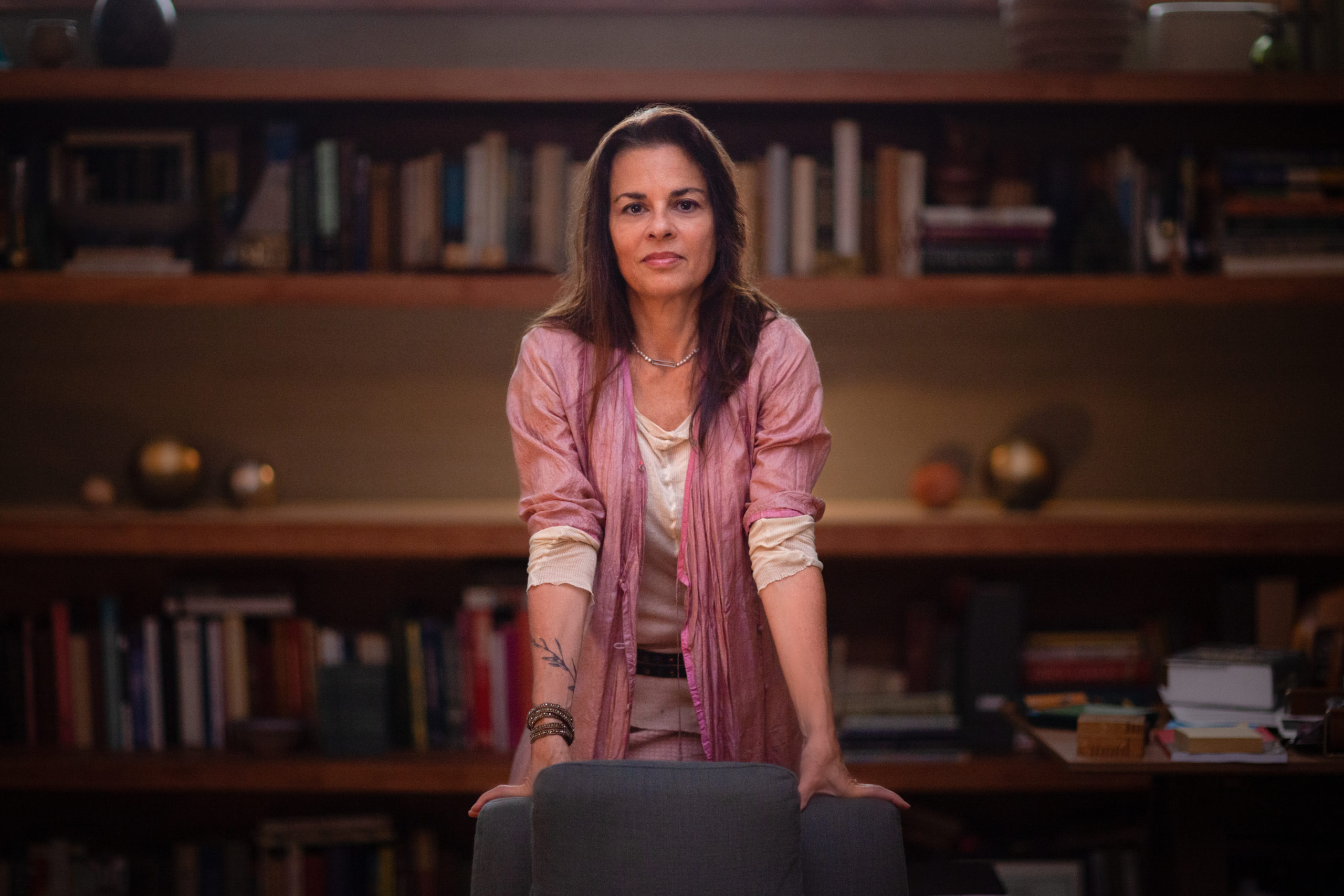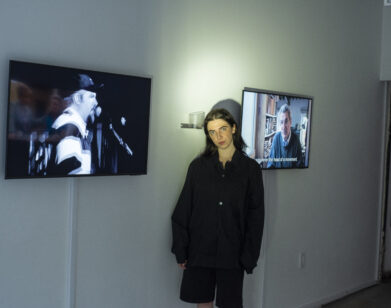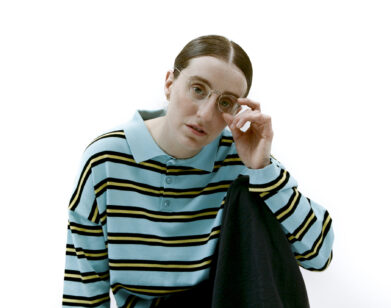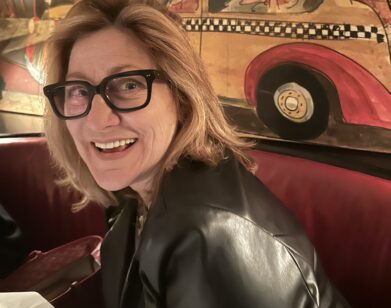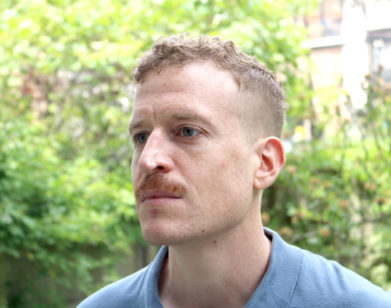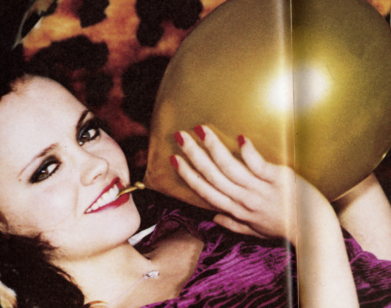V-DAY
Orna Guralnik of Couples Therapy on Her Valentine’s Day Do’s and Don’ts
In September 2019, before the world locked down, Showtime debuted the gripping docuseries Couples Therapy, following three couples over twelve sessions with the Manhattan-based, Israeli-born psychologist Orna Guralnik. By the time much of us were trapped in our homes, avoiding the spread of contagion, the show had amassed a cult following, in part for its bracing and unaffected depiction of therapy, but perhaps more so because of Guralnik herself, a gentle and probing presence on screen as she shepherds her clients through the muddy waters of conflict resolution. Four years and dozens of couples later, Couples Therapy is a hit, with the remainder of its third season debuting in April. For Valentine’s Day, we talked to Guralnik about the pressures of arbitrary holidays, the contradictions of televised psychoanalysis, and why you shouldn’t refer to gift guides when buying your partner a present.
———
JAKE NEVINS: Hi, Orna. How are you?
ORNA GURALNIK: Good, how are you?
NEVINS: I’m good. It’s a pleasure to speak with you. I’m a huge fan of Couples Therapy. It was a real balm for me in the early days of the pandemic.
GURALNIK: Thank you. That’s good. That’s really great to hear.
NEVINS: So, Valentine’s Day is here. In your line of work, do you find that there are any particular issues that come to the fore this time of year?
GURALNIK: Thinking out loud, I can think of two different types of things that could get provoked by this kind of arbitrary day. It’s a little bit like birthdays. I think this is what it’s intended to do. One is that, you might step out of the habitual obviousness of daily life and say, “Hey, this is a chance to kind of get in touch with things we don’t usually pay attention to, like romance and the connection between us,” just infuse the discourse with something more of that nature. It’s a little bit like taking a vacation and breaking out of a pattern. Patterns can be deadening. So that’s great, anything that breaks a couple out of patterns and emphasizes connection is good for romance, especially if it means being more vulnerable, going more towards each other, taking those types of emotional risks with each other.
NEVINS: Right.
GURALNIK: And then there’s the whole other type of experience. Unfortunately, people can also be very prone to having all sorts of expectations and end up disappointed. It reminds me of my kids when they were little. Every birthday, there’s definitely going to be crying because there’s all sorts of romantic, idealized expectations of what should happen on a particular day. And you notice what’s not there and what’s not happening in comparison to these idealized images of what should be.
NEVINS: You said something that I’ve heard you say in your work on the show, “going towards one another.” Despite all the ways Valentine’s Day has been hijacked by industry, do you think there’s something to be said for a holiday that reminds us a bit more explicitly to connect with our partners?
GURALNIK: I think it can go both ways. An event like Valentine’s Day, it really does mean that people need to find some way to take some kind of risk. Otherwise, it’s very easy for those kinds of events to get taken over by a certain kind of empty marketing, by capitalism and consumerism. There’s also the inner replication of that, where you do the thing you’re supposed to do in this kind of mind-numbing, bureaucratic, gesturing, or virtue signaling way, so it’s very easy for things to be emptied out of meaning. I think it’s all about bringing yourself to some kind of surprising edge. And if there’s something on the calendar that gives you bait to do that, great. If you’re just kind of repeating another form of bureaucratic marking, then why bother? That can be more deadening than every day.
NEVINS: Right. You mentioned the twin scourges of capitalism and consumerism. There’s a whole cottage industry for Valentine’s Day, gift guides and the like. As someone who works professionally to help couples navigate difficult times in their relationships, I imagine you find some of this stuff a bit trivializing.
GURALNIK: Yes. Totally trivializing, reductive. I think when people perform these kinds of rituals, they’re actually emptying out their relationship. If they’re going on a best-of list of what to buy their partner, I don’t know, that’s not my cup of tea. I don’t think that’s going to do anything for the relationship. I think there’s a risk of it actually emptying the relationship.
NEVINS: Has Valentine’s Day ever come up as a source of tension among your parents?
GURALNIK: No, no. But in our first season, we had the famous couple of Mau and Annie.
NEVINS: Oh, of course.
GURALNIK: They had that provocative session where Mau was talking about his disappointment around his birthday. I think that’s an example of how people can feel this crazy hype around a particular date that is, in a way, destined to collapse into disappointment. People can read into these gestures: “Okay, how much does my partner see me? Are they just putting a check mark? Is it about them? Is it about me?” A lot of questions can come up for people around these rituals.
NEVINS: Do you consider yourself a romantic?
GURALNIK: Yes, totally.
NEVINS: If you weren’t, would it make your job more difficult?
GURALNIK: I think I’d just work differently if I wasn’t one. I don’t even know what would be better. But I’m a romantic in the sense that I think something pretty, even magical, happens when people fall in love. I think it has the potential to bring out our best selves, and it’s incredibly important for us as individuals, important for our collectives, important for us as living creatures, as mammals. I think it’s a very powerful thing to love another person, to fall in love. I think it takes us out of a more mediocre way of living. I wish it on all of us, romance.
NEVINS: You’re Jewish, I’m Jewish. Has Judaism at all influenced your approach to psychoanalysis?
GURALNIK: That’s a big one. First of all, I think Judaism is actually a very romantic religion that very much values both relationships and community. I think the religious practice is used to invoke certain kinds of romantic feelings, whether it’s romantic feelings towards god, towards one’s partner, towards one’s neighbor, towards one community. The practice is designed to kind of invoke romanticism and transcendence, in that sense. There are other religions that try to do that as well. Religion generally tends to be about helping form community. In terms of Judaism and psychoanalysis in my practice, it’s hard to separate Judaism as a religion and Judaism as a historical, cultural entity. Jews as a group spent so much time being a marginal community within other communities, being in the diaspora, which made them very aware of differences and of the importance of egalitarian relationships. So all of that makes Jews primed to be good therapists.
NEVINS: Oftentimes, they are.
GURALNIK: Yep, yep. So psychoanalysis, in that sense, is a pretty Jewish practice, not only by numbers, but in its nature and in its type of discourse. Not to mention the whole kind of Talmudic practice of studying texts and reading the world as a text; psychoanalysis is all about that.
NEVINS: Now that you’re on television yourself, I’m curious what you think of certain depictions of therapy and psychoanalysis on TV. The Sopranos and In Treatment come to mind.
GURALNIK: First of all, I have to confess, I’m actually quite embarrassed about this, but I hardly watch TV, ever. I’m a little bit ignorant when it comes to TV. I watch a little bit when I can, and when I manage to [watch TV], it’s kind of amazing.
NEVINS: Do you watch your own show, at least?
GURALNIK: Yeah, because when they’re heading towards the end of the edits, they want feedback.
NEVINS: Right.
GURALNIK: I mean, one of the things that appealed to me when the directors approached me about doing this was that they wanted to depict what it’s really like. They’re real documentarians, not reality TV people turned documentarians. They come from the documentary world, vérité. I always joke that there’s such an intense transference towards therapists in pop culture. From what I know, therapists are often portrayed as either very narcissistic, having all sorts of untoward motives, or they’re just bored with their patients. I’ve said this once before to someone, that it’s like the way mom is always to blame. I think people are not keeping in mind that it’s a very seriously ethical profession and the training is all about ethics, and learning how to focus on another person. And of course, there are failings, but people get into the profession for altruistic reasons. They’re not there because they can’t find sex anywhere else, or because they want to make oodles of money. They get into the profession because they actually want to do something good. It doesn’t mean that any therapist is perfect, but we try our best, really, and our training prepares us to do a pretty good job compared to the average person in the world.
NEVINS: Has seeing your sessions on screen changed your approach to therapy in any way?
GURALNIK: My work has definitely changed doing the series. But it hasn’t really changed from seeing myself on the screen. First of all, after every session with these couples, I sit down with our team and we talk about what’s going on, we analyze what happened, what’s the dynamic that’s unfolding, what interventions were helpful. And people give interpretations. So I’ve learned so much just from thinking very, very deeply about each session, each couple, the arc of a treatment and the wisdom of my team. And then I’ve got Virginia, and my peer supervision group. They’re all watching the material and thinking about every detail of the treatment. So I’ve had incredible uber training just doing the show. In that sense, I feel like my work has deepened a lot. And doing it on camera calls for a certain kind of relentless presence that has sharpened my concentration skills.
NEVINS: That brings me to my last question. You’re such a focused, charismatic presence on screen. And culturally, perhaps even professionally, there are certain ideas about therapists and how they should be a kind of blank slate for the patient. How do you reconcile your responsibility to the medium of television with your responsibility to your patients? Or do you reject the notion altogether of the therapist as this nondescript sponge figure?
GURALNIK: That is a very deep and important question that I think about a lot, from the very first second. I think there are inherent contradictions in terms of the idea of privacy and allowing patients the more neutral, less intrusive presence of an analyst. And I think doing this work, my private practice patients see me on TV and see me with other people and I think that disrupts that. And that is a problem. There’s no way to deny that. That gets in the way of that neutral space. On the other hand, the idea of a blank screen, contemporary psychoanalysis has kind of debunked because there is no blank screen, from anything you see in your analyst’s office to the way they respond to you to the color of their skin.
NEVINS: Right.
GURALNIK: And nowadays in contemporary psychoanalysis, we tend to include the subjectivity of the analyst as part of the work rather than a thing that is taken out of the work.In that sense, the show is just kind of a bigger dose of that. The only thing I can say to say something about this problem, and it is a problem, is that hopefully the payoff is worth it. The fact that lots of people get to see what therapy is like, and I get endless fan mail from all over the world that people are so grateful for what the show has done for them. But you put your finger on something very important.
NEVINS: Well, as a fan myself, I’d say it’s worth it.
GURALNIK: My colleagues might think differently. Some colleagues might think, “Ah, this is too much of a compromise of what we do.” But you win some, you lose some.
NEVINS: Well, thank you for taking the time to talk to me.
GURALNIK: Thank you for the interesting range of questions and the depth.
NEVINS: I hope you have a great Valentine’s Day.
GURALNIK: Yes, have a good Valentine’s!

